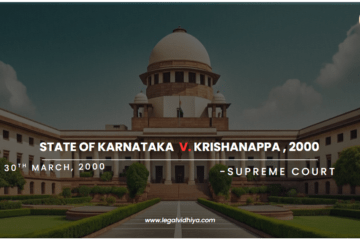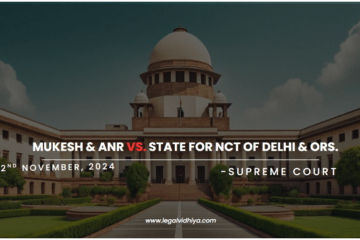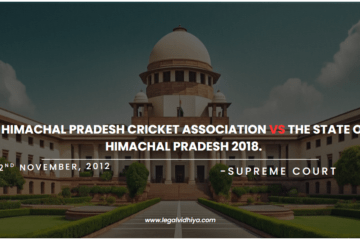
| Citation | Arb.O.P (Com.Div.) No.257 of 2021 and Arb.O.P(Com.Div).No.209 of 2022 |
| Date of judgment | 20 Apirl,2023 |
| Court | Madras High Court |
| Appellant | M/s Prime Store(no.1), Mr. S Kaarthi(no.2), Mrs. Padma Sivalingam(no.3) and Mrs. Shruthi Kaarthi(no.4) |
| Respondent | Sugam Vanijya(no.1), Mr. K.Sivalingam (no.2)& M/s. SCM Silks Private Limited(no.3) |
| Bench | Justice A Ramamoorthy |
Introduction:
In the matter of Prime Store vs. Sugam Vanijya Holding Chennai Silks, a retail operating company, appealed a decision by an arbitrator that favoured Sugam Vanijya, the respondent party. The lease deed agreement issue between the two parties led to their decision to submit it to arbitration. The Arbitration and Conciliation Act’s Section 12(5) any person whose relationship with the parties, counsel, or the dispute falls under one of the categories listed in the seventh schedule is ineligible to be chosen as an arbitrator, regardless of any prior agreement to the contrary.
Facts:
1.M/s Prime Store Petitioner no.1 is a partnership firm engaged in the business of operating and running retail textile in Tamil Nadu known as “The Chennai Silks.” Mr. S Kaarthi, Mrs. Padma Sivalingam and Mrs. Shruthi Kaarthi referred as Petitioner no 2,3,4 rep. are the partners in the Petitioner No.1. Mr. K.Sivalingam & M/s. SCM Silks Private Limited referred to as the Respondent no 2,3 rep. retired from the Prime Store through Partnership Release Deed on 11.09.2019 and 30.09.2019.
2.M/s. Sugam Vanijya Holdings Private Limited, the Respondent 1 is engaged in the business of developing and operating commercial projects and shopping malls.
3.Sugam Vanijya decided to develop a Mall, ‘VR-Chennai’ in Chennai. The petitioner planned to open an e-commerce store and approached the Respondent No.1 for space on lease in the VR Chennai mall.
4. The construction of the mall was completed on 20.04.2018 and the Petitioner No.1 and Respondent No.1 entered into a lease deed on 12.09.2018 which was registered vide Doc. No. 3779 of 2018. The lease deed was amended on 25.09.2018 and certain changes were made in the terms and conditions.
5.The premises were handed over along with the possession notice for a period of 9 years with a lock-in period of 36 months i.e., from 30.11.2018 to 30.11.2021. However, the Petitioners terminated the lease deed due to unexpected circumstances and claimed a refund of interest-free refundable security deposit of Rs. 75,75,480 from Respondent No. 1.
6.The Respondent No.1 in turn claimed an amount of Rs. 11,88,16,397towards rent for the lock-in period and fit-out expenses. As the dispute arose, the arbitration was invoked and under Clause 17.7(b) of the lease deed.
7.On 23.01.2019, the Respondent No.1, without seeking the consent of the Petitioners, appointed an Arbitrator unilaterally. The Respondent No. 1 had raised five claims and the Sole Arbitrator passed an award on 22.03.2021, partly allowing the claims of the Respondent No.1 and rejecting the claims of the Petitioner as the Impugned Award.
Issue raised:
1. Whether the unilateral appointment of the Sole Arbitrator without the express agreement is valid under the A&C Act?
2. Whether the participation of the Petitioners in the Arbitral proceedings will be considered as waiver of rights as per the proviso of Section 12(5) of the A&C Act?
3. Whether the disqualification of the Arbitrator can be challenged under Section 34 of the A&C Act after the passing of an Arbitral Award?
Contentions of the Petitioners:
1.The Petitioners argued that the appointment of the Sole Arbitrator is de jure and ineligible. Further, as per the Section 34 of the A&C Act the Impugned Award is violative of the basic and fundamental principles of natural justice and hence, shall be quashed and set aside.
2. The Petitioner contended that the Impugned Award is inconsiderate of the facts and the Sole Arbitrator has merely favoured the Respondent No.1 without appreciating the documents or facts on record. It was also contended that the Sole Arbitrator had not recorded any express waiver of the Petitioner. Moreover the present case violates Section 12(5) of the A&C Act because the Arbitral Tribunal was established in violation of that provision and Schedule VII of the A&C Act.
3. The Petitioner argued that even though Clause 17(7)(b) of the lease deed permits the Respondent to appoint a Sole Arbitrator, the Respondent should have adhered with the provisions of Section 12(5) of the A&C Act while appointing the Arbitrator as to avoid unfairness and arbitrariness in the arbitration proceedings. Additionally, the Section 12 right way of Schedule VII of the A&C Act, an Arbitrator who has been unilaterally appointed is de jure disqualified to serve in that capacity.
4. The Petitioners further submitted that as the Respondent No.1 unilaterally appointed an Arbitrator, violative of the provisions of Section 12(5) read with Schedule VII of the A&C Act, the Impugned Award shall be quashed and set aside.
Contention of the Respondent:
1.The Respondent No. 1 did not present any supportive evidence or documents for the claim amount. Even then, the Sole Arbitrator had put the burden on the Petitioner and also levied an exorbitant interest of 24%.
2. The Respondent No.1 contended that the Clause 14.3(b) of the lease deed enumerates that in case the Petitioner terminates the lease deed before the expiry of the lock-in period, the Petitioner is required to issue a prior notice of 6 months and 100% of the remaining rent to be paid and Clause 4 of the afterwords provides that 50% of CAM charges rent for the remaining term to be paid as well.
3. It was contended that the Petitioners accepted the appointment and also actively participated in the arbitral proceedings. Furthermore, Section 4 of the A&C Act does not provide for the requirement of any “express waiver”.
Analysis:
Apart from raising various grounds to challenge the award, the petitioners would attack the impugned award primarily on the ground of unilateral appointment of the Arbitrator.
After looking at the previous case. The High Court relied on TRF Ltd. v. Energo Engineering Projects Ltd., [(2017) 8 SCC 377] and Perkins Eastman Architects DPC & Anr. v. HSCC (India) Ltd [2019 SCC Online SC 1517] and held that the person stated in the Section 12 and Schedule VII of the A&C Act would be ineligible to be appointed as an Arbitrator. Further, in the present case, there is no express consent of the Petitioner for the appointment of the Sole Arbitrator and the Petitioner have also participated in the proceedings. The High Court held that the Sole Arbitrator unilaterally appointed by the Respondent is ineligible and hence, becomes de jure to perform his functions as per the provisions of Section 12(5) ,Schedule VII of the A&C Act.
- The Court relied on Hindustan Zinc Ltd. v. Ajmer Vidyut Vitran Nigam Ltd. [(2019) 17 SCC 82] and held that the ineligibility of an Arbitrator can also be challenged under Section 34 of the A&C Act.
As regard the express waiver the judgment which was relied upon the petitioners in the case of Hina Suneet Sharma & Anr. V. M/s Nissan Renault Financial Services India PVT. Ltd. , the facts and the circumstances are different and will not apply to the present facts of the cases
Judgement:
1.Justice Krishnan Ramasamy of a single-judge bench ruled that the proviso to Section 12(5) of the Act’s proviso prohibits the unilateral appointment of a sole arbitrator without the express written consent of the parties was held unconstitutional.
2.The judgement was based on an award dated March 22,2021.In the case, the retail company Chennai Silks appealed a decision by an arbitrator.
3.The High Court had ruled that a party involved in a dispute cannot unilaterally appoint an arbitrator.Any award made as a result of such a unilateral appointment is void. The High Court held that the Sole Arbitrator unilaterally appointed by the Respondent is ineligible and hence, becomes de jure to perform his functions as per the section 1213(5)of A&C act.
4.The Court further observed that the Petitioner did not provide any agreement in writing in accordance with the proviso of Section 12(5) of the A&C Act to waive their right. Moreover, the Sole Arbitrator also should not have proceeded with the proceedings without the consent of the Petitioner. It was held that an award passed in such proceedings shall be quashed and set aside.
5.Hence, the Petitioners had not waived off their right to object the appointment of Arbitrator in terms of proviso of Section 12(5) of the A&C Act.
Conclusion:
The Madras High Court has upheld the provision relating to the appointment of the Arbitrator and adhering to the principles of natural justice. An Arbitrator cannot be unilaterally appointed as it is violative of Section 12 Schedule VII of the A&C Act. Furthermore, the ineligibility of an Arbitrator can be challenged under Section 34 of the A&C Act. The Arbitral Award was quashed and set aside as the Arbitrator was unilaterally appointed and it was in violation of principles of natural justice as well as the legislative intent. Hence, unilateral appointment of Arbitrator is bad in law and hence, the award was quashed and set aside.
References:
- AIR online.
- https://www.livelaw.in
- The legalaffair.com
This article is written by Ridhima Sharma student of law school University of jammu and intern at legal vidhiya.
Disclaimer: The materials provided herein are intended solely for informational purposes. Accessing or using the site or the materials does not establish an attorney-client relationship. The information presented on this site is not to be construed as legal or professional advice, and it should not be relied upon for such purposes or used as a substitute for advice from a licensed attorney in your state. Additionally, the viewpoint presented by the author is of a personal nature.




0 Comments